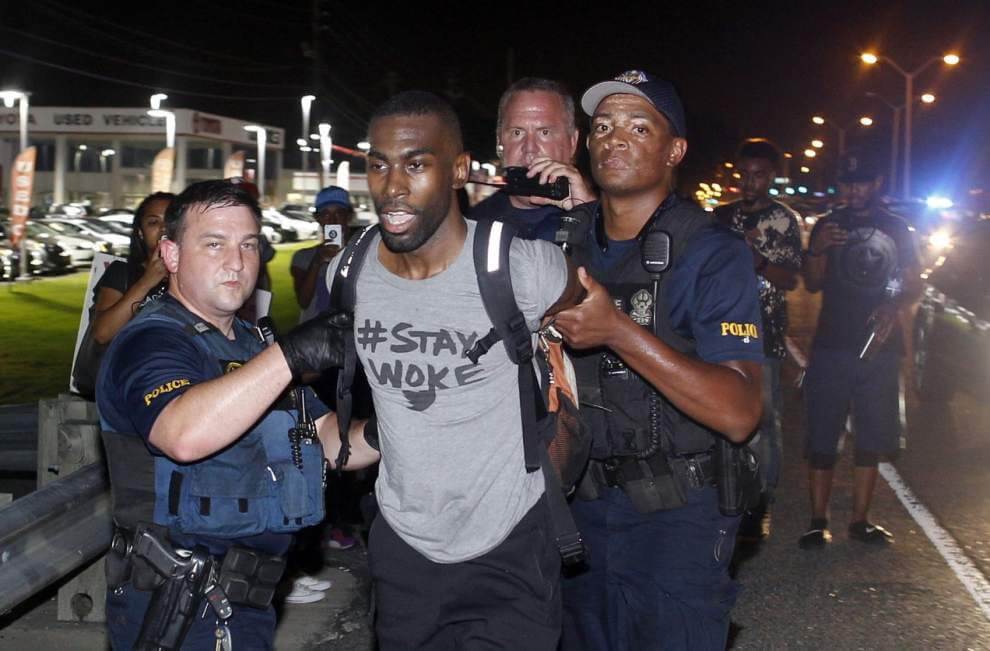
Supreme Court blocks injured officer’s suit against leader of Black Lives Matter rally
The Supreme Court on Monday set aside an appeals court ruling by a panel of conservative judges that held an injured police officer could sue and win damages from the leader of a Black Lives Matter protest rally.
The case had raised alarms among civil libertarians, who said it threatened the rights to free speech and protest.
The suit by a Baton Rouge, La., police officer identified only as John Doe did not allege that civil rights activist DeRay Mckesson led, directed, encouraged or participated in the violence or the assault on the officer. Rather it said only that he was “in charge of the protests” and “did nothing to calm the crowd.”
McKesson led a rally in July 2016 several days after Alton Sterling, a 37-year-old Black man, was shot and killed by two police officers who tackled him outside a convenience store.
The Black Lives Matter rally blocked a highway in front of the police station, and officers in riot gear stood outside to confront the crowd. Some protesters began hurling water bottles, and an identified person threw a piece of concrete or a rock that struck an officer in the face. He suffered a brain injury, a loss of teeth and a broken jaw. More than 100 people, including Mckesson, were arrested.
The officer filed a lawsuit seeking to hold Mckesson liable for his injuries. A federal judge initially dismissed the suit, but last year, to the surprise of civil libertarians, a three-judge panel of the 5th Circuit Court in New Orleans revived the suit.
These judges noted the protesters were illegally blocking a highway. “We ultimately find that Mckesson’s conduct at this pleading stage was not necessarily protected by the 1st Amendment,” wrote Senior Judge E. Grady Jolly, a Reagan appointee. “We perceive no constitutional issue with Mckesson being held liable for injuries caused by a combination of his own negligent conduct and the violent actions of another that were foreseeable as a result of that negligent conduct.”
The American Civil Liberties Union called the ruling a threat to protests nationwide and urged the justices to intervene to block the suit from going forward in Louisiana courts.
“If the law had allowed anyone to sue leaders of social justice movements over the violent actions of others, there would have been no civil rights movement,” said David Cole, the ACLU’s legal director.
The justices considered the appeal for several weeks and issued an unsigned ruling on Monday that set aside the appeals court ruling and asked the Louisiana Supreme Court to consider whether the police officer’s suit could proceed under state law.
“Under the unusual circumstances we confront here, we conclude that the 5th Circuit should not have ventured into so uncertain an area of tort law — one laden with value judgments and fraught with implications for 1st Amendment rights — without first seeking guidance on potentially controlling Louisiana law from the Louisiana Supreme Court,” the court said in Mckesson vs. Doe.
The justices noted that it was not clear under state law that Mckesson had violated any “duty” that would subject him to a lawsuit. It was also uncertain whether a police officer may sue for injuries that occurred when he was acting in the line of duty.
Justice Clarence Thomas dissented but did not say why. Newly seated Justice Amy Coney Barrett took no part in the decision, though she participated for the first time Monday in oral arguments on two other cases.
The case has already prompted an unusual switch in positions by Judge Don R. Willett, a Trump appointee who was listed as a potential Supreme Court nominee. He had at first joined the 3-0 decision appellate written by Jolly but changed his mind and issued a dissent a few months later.
“I have had a judicial change of heart. Further reflection has led me to see this case differently,” he wrote. “As Justice Frankfurter elegantly put it 70 years ago, ‘Wisdom too often never comes, and so one ought not to reject it merely because it comes late.'”
He said, “Officer Doe risked his life to keep his community safe that day — same as every other day he put on the uniform. He deserves justice. Unquestionably, Officer Doe can sue the rock thrower. But I am unconvinced he can sue the protest leader.”
The dissent prompted a move to have the panel’s decision reconsidered by the full 5th Circuit Court, but it failed on a tie vote of 8-8.

